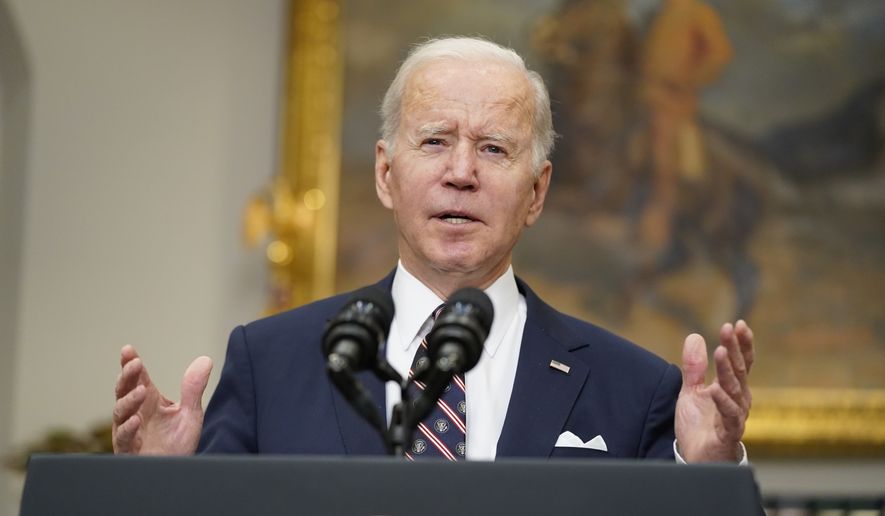What a difference a decade makes.
President Biden, an infamous dissenter of the 2011 raid that killed al Qaeda leader Osama bin Laden, signed off on an equally risky and remarkably similar mission in northwestern Syria on Wednesday that resulted in the death of Islamic State head Abu Ibrahim al-Hashimi al-Qurayshi.
During both operations, U.S. Special Forces raided a compound in a primarily residential area, encountered women and children essentially used as human shields, relied heavily on local intelligence assets for information on the site and had to destroy a disabled military helicopter at the end of the mission.
For Mr. Biden, the death of al-Qurayshi is a desperately needed political win during a string of domestic crises, with skyrocketing inflation, a resurgent COVID-19 pandemic and unchecked illegal immigration at the southern border.
It also temporarily takes some of Washington’s foreign policy focus away from the standoff along the Russia-Ukraine border. The White House faces growing criticism for its handling of the crisis and its apparent willingness to negotiate with the Kremlin.
Still, the raid is sure to raise deeper questions about whether Mr. Biden’s ill-fated advice in 2011 and the subsequent political blowback have affected his decision-making. U.S. officials said the mission had been planned for months.
SEE ALSO: Pentagon: Death of ISIS leader in U.S. commando raid will hurt future operations
Mr. Biden faced withering criticism for urging President Obama to hold back on the bin Laden raid. He said he believed it was best to conduct more reconnaissance before sending U.S. troops into such a dangerous situation.
“I’m the last person in the room. And again, this is a place where I’ve got to reserve space, in my view, for the president,” Mr. Biden told CNN during its recent “President in Waiting” documentary. “There was one option that was remaining. You could have done one more very low flight … spying down on the site to determine whether this was bin Laden.”
“I said, ’Mr. President … I think you should wait and do one more pass,’ knowing that if you did a lower pass they might observe it and [bin Laden] would flee,” Mr. Biden said before praising Mr. Obama for disregarding his advice.
“It took real courage to make that decision,” he said.
Indeed, Mr. Obama approved the mission on May 2, 2011, over the objection of his vice president. The dissenting stance has haunted Mr. Biden ever since. It was one of the decisions that led Robert M. Gates, who served as the Obama administration’s first defense secretary, to eviscerate Mr. Biden’s foreign policy wisdom.
“I think he has been wrong on nearly every major foreign policy and national security issue over the past four decades,” Mr. Gates wrote in his 2014 book, “Duty: Memoirs of a Secretary at War.”
SEE ALSO: Islamic State top leader kills himself as U.S. special forces converge in Syria
Mr. Biden also faced heat from President Trump during the 2020 election campaign. The incumbent used the issue to cast doubt on whether Mr. Biden could be trusted on issues of counterterrorism.
“If it were up to Joe, bin Laden … would still be alive,” Mr. Trump tweeted in September 2020.
The Hill reacts
Prominent Republicans on Thursday expressed strong support for the raid but acknowledged some surprise that Mr. Biden approved it. Some tempered their praise with criticisms of Mr. Biden’s counterterrorism policies more generally, particularly in light of the disorganized and bloody retreat from Afghanistan last summer.
“I think he understands the threat from ISIS. And yeah, I was actually pleasantly surprised, to be honest with you. I think it was a good step,” Rep. Michael T. McCaul, Texas Republican and ranking member on the House Foreign Affairs Committee, told The Washington Times.
The value and notoriety of the two targets, bin Laden and al-Qurayshi, varied considerably.
Al-Qurayshi took over as the de facto head of the global ISIS network in 2019. He had nowhere near the household name status that bin Laden earned during his years as the leader of an anti-U.S. jihadi movement across the Middle East.
Still, the military missions that resulted in their deaths share many similarities. Both terrorists were holed up in compounds in residential neighborhoods, al-Qurayshi in Syria’s Idlib province and bin Laden in Abbottabad, Pakistan. Both had their families with them in their well-protected compounds.
Neither left his residence. They communicated with their deputies through other means. Officials said al-Qurayshi often gave orders via courier.
In both instances, the commander in chief — Mr. Obama in 2011, Mr. Biden on Wednesday — opted for a Special Forces ground operation rather than an airstrike, putting U.S. troops at more risk but reducing the chances of civilian casualties and collateral damage.
U.S. helicopters encountered problems during both missions. In Abbottabad, a Black Hawk crashed as it arrived at the scene. In Syria, a helicopter sustained mechanical failures, officials said. Both were destroyed as U.S. personnel left the scene.
Despite the questions facing Mr. Biden, he struck a tough tone Thursday morning and used the mission to send a message to other terrorists around the world.
“We will come after you and find you,” he said.
• Joseph Clark contributed to this report.
• Ben Wolfgang can be reached at bwolfgang@washingtontimes.com.




Please read our comment policy before commenting.